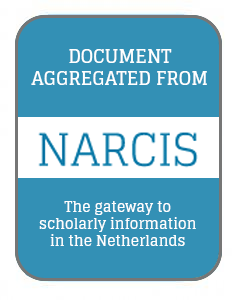Focal point
Location
National Academic Research and Collaborations Information System (NARCIS) is the main Dutch national portal for those looking for information about researchers and their work. NARCIS aggregates data from around 30 institutional repositories. Besides researchers, NARCIS is also used by students, journalists and people working in educational and government institutions as well as the business sector.
NARCIS provides access to scientific information, including (open access) publications from the repositories of all the Dutch universities, KNAW, NWO and a number of research institutes, datasets from some data archives as well as descriptions of research projects, researchers and research institutes.
This means that NARCIS cannot be used as an entry point to access complete overviews of publications of researchers (yet). However, there are more institutions that make all their scientific publications accessible via NARCIS. By doing so, it will become possible to create much more complete publication lists of researchers.
In 2004, the development of NARCIS started as a cooperation project of KNAW Research Information, NWO, VSNU and METIS, as part of the development of services within the DARE programme of SURFfoundation. This project resulted in the NARCIS portal, in which the DAREnet service was incorporated in January 2007. NARCIS has been part of DANS since 2011.
DANS - Data Archiving and Networked Services - is the Netherlands Institute for permanent access to digital research resources. DANS encourages researchers to make their digital research data and related outputs Findable, Accessible, Interoperable and Reusable.
Members:
Resources
Displaying 211 - 215 of 1863Do housing wealth and tenure (change) moderate the relationship between divorce and subjective wellbeing
Homeownership, as a storage for housing wealth, is believed to play an increasingly important role in terms of welfare provision. However, homeownership does not always act as a nest-egg, it can be a source of financial anxiety as well. In this paper we investigate how homeownership and housing wealth moderate the relationship between divorce and subjective wellbeing (life satisfaction, happiness, financial satisfaction).
Uniting forest and livelihood outcomes? Analyzing external actor interventions in sustainable livelihoods in a community forest management context
External actor interventions in community forest management (CFM) attempt to support communities with developing forest institutions and/ or improving their livelihoods portfolio. Common pool resource (CPR) scholars argue that forest institutions are required to prevent overharvesting of the forest resource stock (appropriation dilemma), and to encourage investment in its maintenance (provision dilemma). The sustainable livelihoods approach (SLA) has been widely used to analyse the influence of interventions on rural livelihoods portfolios.
The rush for land in an urbanizing world : from land grabbing towards developing safe, resilient and sustainable cities and landscapes
This article aims to contribute to current discussions about ‘making cities inclusive, safe, resilient and sustainable’ (SDG 11) by linking debates that are currently taking place in separate containers: debates on the ‘global land rush’ and the ‘new urban agenda’. It highlights some important processes that are overlooked in these debates and advances a new, socially inclusive urbanization agenda that addresses emerging urban land grabs.
Multifunctionality at what scale? A landscape multifunctionality assessment for the European Union under conditions of land use change
Context: The provision of multiple ecosystem services (ES) within a landscape is commonly referred to as landscape multifunctionality. Modifying landscapes to increase multifunctionality and reduce trade-offs with concurrent services bears the potential to enhance sustainability in human-dominated landscapes. Assessing landscape multifunctionality is thus crucial for land management and planning, but lack of a clear definition and operationalization of multifunctionality impedes comparisons of different study results.
Ecosysteemdiensten als ordenend principe voor duurzaam bodembeheer en gebiedsinrichting : Rekenen met de Triple-O aanpak in het Leiden Bio Science Park
Het RIVM heeft meegewerkt aan de ontwikkeling van een methode waarmee kan worden afgewogen welk bodembeheer en welke ruimtelijke inrichtingsplannen het meest bijdragen aan een 'duurzame' groene infrastructuur in een gebied. Deze zogeheten Triple-O aanpak biedt mogelijkheden om de voordelen die de mens heeft van een natuurlijk systeem (bodem, water en groen, oftewel ecosysteemdiensten) in te zetten bij bodembeheer en gebiedsontwikkeling. Triple-O staat voor Ontdekken, Overeenkomen en Ontwikkelen.



